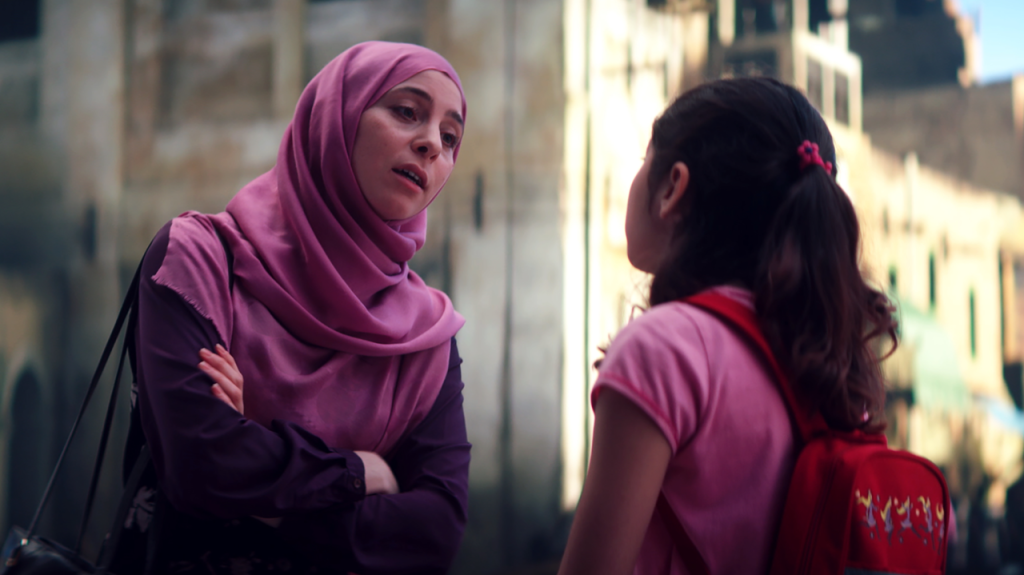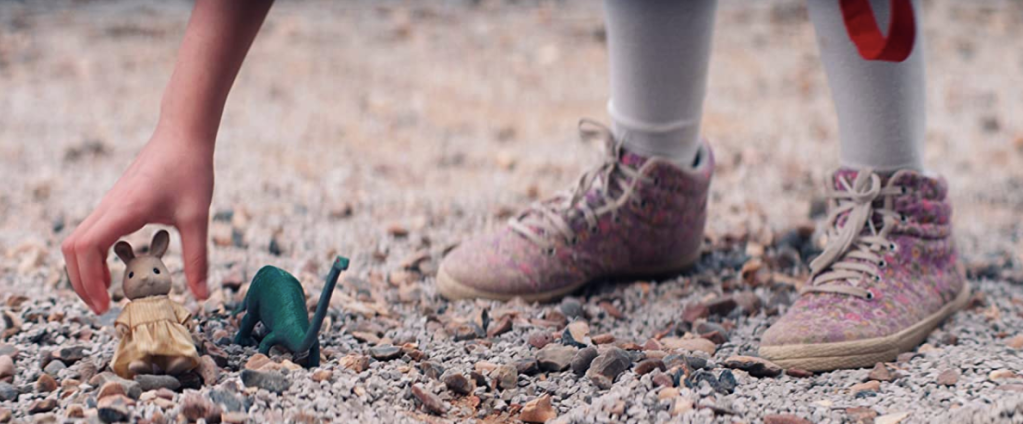Fireworks deserves to be a larger project on a major streaming service. It takes a more mature approach to intelligence services in the current era.
While recent works like Killing Eve and Top Gun: Maverick create fantasy worlds, Fireworks is firmly planted in a time of drone strikes in the Middle East.
As discourse around the War on Terror puts greater accountability on the West, Fireworks is refreshingly in line with the zeitgeist.
The cast includes Denise Gough (Andor), Ivanno Jeremiah (Humans, Black Mirror), Charlotte Riley (Wuthering Heights) and Raghad Chaar.
During the press screening, Chaar (whose family moved from Syria to the UK) spoke about the importance of her role as a Syrian mother affected by the drone strikes. Her character’s story is rarely told.
Fireworks takes place within an MI6 Ops Room with a marketplace in Tripoli literally sharing the scene through what Director Peter J Franklin calls The Volume, a Virtual Production screen.

Franklin may be making his directorial debut, but he is a two time Academy Award Winner for Best Visual Effects on Inception and Interstellar.
DNEG have teamed up with StoryFuture’s Academy (formed by Royal Holloway and the National Film & Television School) to give an accesible behind-the-scenes look at the Virtual Production filmmakig process.
BAFTA Winning Producer Annalise Davis (The Railway Man) shares her insight on the making of Fireworks and what sets it apart among spy thrillers.
What brought you to Fireworks?
I’ve worked with writer Steven Lally and director Paul Franklin for years on various features. They brought me this as a script and initially I wasn’t super keen on making another short.
Steve’s writing is always fantastic though, and through many conversations we also realised we could make the film using brand new Virtual Production technology in a way that serviced the story and the characters; FIREWORKS opens up the world of an MI6 Ops Room in a way that hasn’t really been seen before.
We can see the shadowy blobs of people on the computer screens in the Ops Room, but Virtual Production opens up this world so we see the real people that the MI6 characters are so casually discussing killing.
I was really excited to be doing something so cutting edge whilst still being in complete service to the story.

As a producer, what do you look for in new projects?
Stories that will excite and engage audiences, whilst smuggling in more serious political or sociological films. I also tend to only go for films with female leads.
What excites you about sharing this film with the world?
It’s a brilliant script, fantastically directed; it has a cast of smart, distinctive characters, and shows us a collision of two worlds – an MI6 Ops room and the Tripoli target they are considering bombing. It combines high drama with dark wit and ultimately a gut punch decision that has to be made which will affect all our characters in very different ways.

What energised you while working on set during Covid and with new technology?
Ha! Working with Covid is a challenge. We had several false positive tests, including one of our actors, so we had to re-write the script on the hoof in order to give us the 24 hours we needed to get his accurate test results back. That was hairy.
The new technology is fantastic but also a challenge. Because nobody had really worked with it in the UK at the time we shot, we had to build our own Virtual Production screen (not something I would ever recommend doing again, but we made these early mistakes so other people don’t have to!).
And obviously with such new technology it broke down a lot and so we regularly had to re-schedule and re-think our shoot in order to work with these challenges. But film-makers are smart, resilient and great lateral thinking problem solvers – I always believe that as long as you have the right people around you, anything is possible!

Could you explain how The Volume works?
I can explain it in lay person’s terms as I am not technical. Imagine a very large TV screen, and the images of what you’re going to see are loaded onto it for the shoot (so unlike with a green screen, everything is done in camera).
What sets Virtual Production apart is when the camera moves, the image does too, so you get a parallax effect. This adds to the feeling of realism and creates real energy, both on screen and on set.
How did you gather the images for Aleppo?
Jamie Lapsley, our very talented production designer, went on a lot of Russian websites to source most of her images. She designed the world of the Ops Room and Tripoli holistically, imagining that the Ops Room has simply been placed into the middle of that Tripoli marketplace. I think that adds to the feeling that you’re really there.
Incidentally, if we were doing that now, we wouldn’t build the world from scratch, we would go out to the locations, film them, re-design them, then put them on the screen. See my above note about us making mistakes so nobody else has to!

How does it feel to work with a new form of virtual production?
Very exciting and at times nerve wracking. But I went into it so ignorant that I didn’t know to be scared. It’s only looking back I think ‘hmmm, probably shouldn’t have built a virtual world from scratch and our own pop-up screen’ – amongst other lessons learned!
How do you think it helps with Fireworks’ storytelling and appeal?
It expands the world of Tripoli so you feel as if you’re really there, and makes the Tripoli characters – who would normally be blobs on an MI6 Ops room screen – real people. It enhances the emotional impact, and also helps makes us question our at times casual attitude to things happening half way around the world.
Fireworks makes great use of the spy thriller genre. How do you think it also subverts audience expectations?
The humour. Steve Lally has researched these Ops Rooms a lot, and perfectly captures that even though these people work with life and death decisions, it’s still another day at the office. So they bitch and moan about coffee and food and are obsessed with toilet breaks and what they can get away with without their bosses noticing.
And people are really funny, so FIREWORKS is at times laugh out loud funny. But what it also does is slowly turn the screws on the audience so the humour suddenly gives way to something altogether more serious and concerning. I love being able to do that with a film – lull an audience into laughter before pulling the rug out from under them.

The acting performances are truly wonderful. What was the casting process?
I know, right? I love all of our cast.
We had a brilliant casting director, Kate Ringsell, who perfectly understood the script and the tone we were aiming for. And of course it helps that we had a stand out script with extremely well written characters and snappy dialogue.
The casting process itself was fairly standard, in that Kate sent us her suggestions, and where relevant, peoples’ work. We knew we needed really great actors who could handle this kind of comedy – it’s funny, but they have to play it totally straight, and often throw away the lines.
And obviously we wanted to ensure we had as diverse a cast as possible, whilst still casting the very best actor for each role. I think we very much succeeded with this.

How did you work to find the balance between humour and gravity?
It’s a combination of a great script, smart direction, brilliant actors – and a very delicately balanced post production process. The edit had to work with the rhythm of the dialogue and the comedy, and the sound and music were also crucial. In general comedy works best with less music, so we stripped it back at the beginning, building it towards the end as the film becomes more serious.
And we used the same strategy with the sound. The noises of Tripoli become ever more present – except in one place; Gillian Lye drags Pep into the ‘vestibule’ area to explain to him her morals – she carries all the atrocities this terrorist has carried out on her phone, as a reminder of why she does what she does. It’s a complex but strong moral argument, and in that moment you understand her moral code and idealism. And it’s a half way convincing argument.

And so here we completely took away the noises of Tripoli, and it’s kept in the deep background, very out of focus. Because she has been so convincing in her own moral argument as to why she has to bomb the area, the emotional pull of the Tripoli marketplace noises is extinguished.
But – the minute Sherberg offers Lye a promotion in exchange for setting off the bomb, and Lye says yes – the Tripoli noises come back with a vengeance. Because Lye’s easy acceptance of this carrot has exposed her lie to Pep, and to herself – she tells herself she is doing this for her moral reasons, but really she’s out for herself and her own career.
That’s a long explanation for the fact that for about one minute of the film we decided to completely lose all Tripoli noises.

Do you have a favourite line?
I don’t have a favourite line, but I can tell you the one that always gets a laugh – Charlotte Riley’s character saying to Hammed Animashaun’s character ‘are you eating’ and him chewing whilst shaking his head and saying ‘no-oh.’ They are both brilliant actors and Hammed can make anything funny. He’s a comic genius who also grounds his performance with warmth and vulnerability.
How do you think Fireworks helps us understand, as Brits, the current abuses of power in our institutions?
Despite how institutions present as all knowing, or incorruptible; ultimately, they’re all run by people. And people are always fallible.

Leave a comment